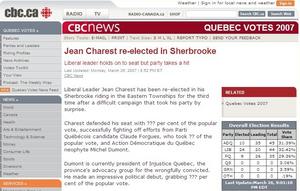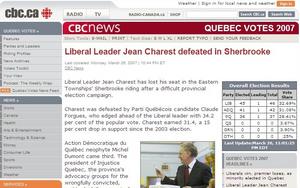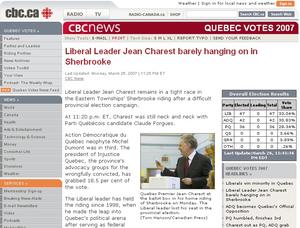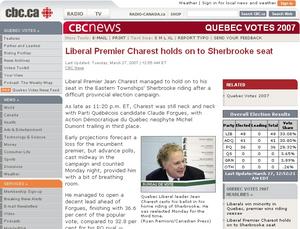I’d hate to be at the postmortem that is likely scheduled this morning at CBC.
Tag: CBC
CBC “investigates”
Last night on CBC’s Fifth Estate, reporters investigated the Ontario Lottery and Gaming Corporation over insider lottery wins by clerks. From the CBC’s website:
LUCK OR LARCENY?
Wednesday March 14 at 9pm & midnight on CBC-TVIn our ongoing investigation into the high incidence of insider lottery wins by retailers, the fifth estate now has obtained new evidence, in leaked documents, that show the Bob Edmonds case was far from an isolated story.
At the same time the OLG was publicly insisting that the case of the 83-year-old Coboconk, Ontario resident who had been swindled of his prize winning ticket was an anomaly, it was investigating other retailer wins and making payouts, in the millions of dollars.
CBC claims that “OLG was publicly insisting that the case… was an anomaly”.
In fact, in a news article on its website today, CBC writes:
Contrary to the Ontario Lottery and Gaming Corp.’s claims, the case of an elderly Ontario man whose $250,000 lottery ticket was stolen by a retail clerk might not have been an isolated one, the CBC has learned.
A new Fifth Estate investigation reveals that ticket retailers might have stolen winning lottery tickets before — and that the OLG might have known about it and paid out millions anyway.
The Fifth Estate obtained a leaked OLG document showing the organization has investigated similar cases of suspected insider fraud since as early as 2003.
In that year alone, the OLG was looking into six suspicious lottery claims from lottery ticket clerks whose stories did not add up. One of those six cases involved 82-year-old Bob Edmonds, the Coboconk, Ont., resident who sued the OLG, alleging his $250,000 ticket was fraudulently claimed at a local corner store.
These paragraphs lead the news story and provide the foundation of the story that the CBC highlighted in the Fifth Estate last night. The thesis of the Fifth Estate is that the OLG Corporation to this day insists that the Edmonds insider win case was an anomaly or “an isolated one”. Further the implication that an inside OLG document was “leaked” (ie. was secret) and that the OLG was somehow covering up previous investigations doesn’t quite seem right on CBC’s part.
Consider the information available on CBC’s own website dated October 25th, 2006:
After an investigation by the CBC’s The Fifth Estate alleged that a disproportionate number of clerks and retailers win large lotteries in Ontario, the province’s gaming corporation has defended its security practices.
“It is critical to note that when a retailer/clerk wins a major prize, [Ontario Lottery and Gaming Corporation] conducts an investigation 100 per cent of the time,” said a statement released Wednesday.
“Each case is thoroughly investigated by our internal staff. If OLG believes there is a serious concern with a lottery prize claim, the police are contacted.”
Police have been contacted four times in the past five years, said the corporation, adding that two of those instances were for information purposes.
Why was the CBC implying in yesterday’s story (and in last night’s Fifth Estate) that the OLG was publicly claiming the Edmond’s case as an isolated incident while in secret (learned from a leaked memo) calling in numerous police investigations on insider wins by clerks?
It seems that the OLG was quite upfront and public about previous investigations. Police investigations aren’t exactly hush-hush.
Furthermore, consider OLG president Duncan Brown’s very public quote in the National Post back on November 23rd, 2006:
“We sell 225 million scratch tickets every year. Since 1999, we’ve had nine confirmed reports of potential tampering of tickets by retailers and about half of those cases were referred to the police. In at least one case, a charge was laid.”
With this additional context, it doesn’t appear that the OLG has been covering up previous investigations. When one looks at previous news reports (via CBC and the National Post), we learn that the OLG has been public in acknowledging its calls for and use of police investigations regarding insider wins and ticket fraud.
We get letters!
The other day, I got an email from Dr. Tom Flanagan, political science professor and close adviser to Prime Minister Stephen Harper.
Dr. Flanagan writes:
This afternoon (March 6, 2007) I got a call from CBC TV news reporter Krista Erickson. She said she was desperately seeking someone to provide balance for a story she was doing on Christine Tell and the Saskatchewan Judicial Appointments Committee. Ms. Tell is the law enforcement representative on the JAC. The Liberals are calling for her to resign because she has also decided to run for the Saskatchewan Party in the next provincial election. I said that I didn’t really want to comment on Ms. Tell because I didn’t know her and didn’t have first-hand knowledge of the facts of her case, but that I would be glad to defend the government policy on JACs.
Ms. Erickson said a crew would be there in 20 minutes to interview me. Then she called back and said that the story had been scrubbed, so they wouldn’t need an interview after all.
When I watched the National at 10 PM, I saw that they ran the story after all, and without balance. They had law professor Lorraine Weinrib to call for Ms. Tell’s resignation, but no one to give a view from the other side. I’ve watched the CBC for too many years to be surprised at the lack of balance, but I am genuinely surprised at the lack of professionalism. I’ve been cut out of stories before, and I can’t complain about it; no one has a right to appear on the CBC. But why didn’t Ms. Erickson just tell me, we don’t want your interview after all because it doesn’t fit into the one-sided story line we are planning to construct? Or, we can’t interview you because you don’t have the right expertise? Why did she have to make up a story abut canceling the story?
I’d like to know where the CBC was from 1993 to 2005, when Jean Chretien and Paul Martin were filling the bench with Liberal donors, failed Liberal candidates, and spouses of Liberal advisers. Our national network has its collective knickers in a knot because a JAC member is associated with a provincial party, but it never found it worthwhile to report on twelve years of appointing Liberal partisans to the federal courts.
Tom Flanagan
Here’s the CBC report:
As you can see, only one “expert” is called upon to comment and that expert supports the thesis that Tell’s participation is inappropriate. If Flanagan were to comment, he’d provide balance. I decided to call Dr. Flanagan to provide that very balance that was lacking in the CBC piece:
The CBC’s Journalistic Standards and Practices Part III section 5.1 reads:
“Single programs dealing with a major controversial issue should give adequate recognition to the range of opinion on the subject. Fairness must be the guiding principle in presentation, so that the audience is enabled to make a judgment on the matter in question based on the facts.”
So what is the story about? The story is about a conservative sitting on a committee that suggests candidates to the Conservative Minister of Justice. The Minister can disregard the suggestions, of course.
UPDATE: Things get even more interesting when John Carpay of the Canadian Constitution Foundation leaves me a voicemail. I’ve reproduced it below with his permission:



